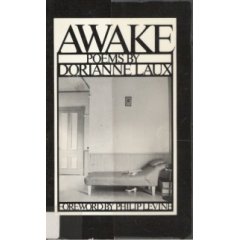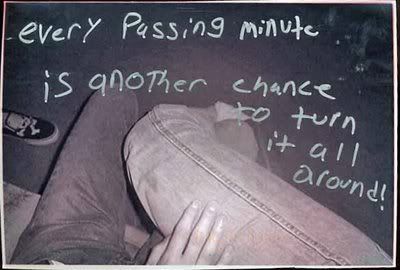Poetry Thursday
 This week's selection for Poetry Thursday is Awake by Dorianne Laux. I'd read some of her poems here and there and of course I'd read the Poet's Companion she co-authored with Kim Addonizio but I'd never read a full-length collection of hers before. I wasn't sure what to expect but I was not disappointed.
This week's selection for Poetry Thursday is Awake by Dorianne Laux. I'd read some of her poems here and there and of course I'd read the Poet's Companion she co-authored with Kim Addonizio but I'd never read a full-length collection of hers before. I wasn't sure what to expect but I was not disappointed.Awake is Ms. Laux's first book of poems, published when she was nearing forty. Laux came to poetry relatively late; a high school dropout, she started writing poems seriously when she was in her early thirties. By this time, she'd married and had a young daughter, and it's these experiences that shape many of the poems in Awake.
The book itself is fewer than thirty poems, divided into three sections. The first section opens with a poem titled "Ghosts", in which the poet describes watching a young couple paint a room in a house across the street. The couple, who are obviously in love, remind the poet of all the lost loves and missed opportunities of her youth. In the end, she gets into bed with the man she loves, weighted down by the memory of all the others who came before him. In this poem, she sets the tone for the rest of the book as one of remembrance, sorrow, and loss.
The early poems describe events from her childhood, memories of her mother, father, sister. Seemingly innocent events often veer into dark territory in poems such as "What My Father Told Me", which intertwines a simple description of chores with memories of sexual abuse. In many of these poems, there is a certain brutality that makes you wince when you read them. Your reaction is visceral; you want to turn away from the page but it's impossible. Laux draws you in as a silent witness to all this pain that belongs to others but also to herself.
The title poem, "Awake", offers a quiet moment of hope in the midst of all this seeming despair.
AWAKE
Except for the rise and fall of a thin sheet
draped across your chest, you could be dead.
Your hair curled into the pillow.
Arms flung wide. The moon fills our window
and I stand in a white
rectangle of light. Hands crossed
over empty breasts. In an hour
the moon will lower itself. In the backyard
the dog will bark, dig up his bone
near the redwood fence. If we could have had
children, or religion, maybe sleep
wouldn't feel like death, like shovel heads
packing the black earth down.
Morning will come because it has to.
You will open your eyes. The sun
will flare and rise. Chisel the hills
iinto shape. The sax player next door
will lift his horn and pour
music over the downturned Vs of rooftops,
the tangled ivy, the shivering tree,
giving it all back to us as he breathes:
The garden. The hard blue sky. The sweet
apple of light.
The poems of the closing section are interspersed with images of sex, death, war, destruction. These are not poems for the faint of heart. They are not poems for people who like their poetry innocent or who think certain subjects aren't appropriate for poetry. They are poems about life, in its sweetest and most horrific moments; their open frankness may not suit everyone. But beyond that, these poems convey a truthful and honest vision of the world. You just have to be willing to open your eyes to see it.
To read more about Dorianne Laux, click here.
For more of her poems, click here.
To buy her books, click here.
When you're done here, swing over to Fringes' blog and tell her what your poet dreams are. Then, go over to Justin's blog and read his poem for this week. Just make sure not to ask him if he wants any more guava.


6 Comments:
Thank you for the link. I appreciate it.
I'm not sure if anyone's been by today, I haven't paid attention. If not, I will bump you up to the to, how's that?
Smoke is the best of her first 3 collections; I haven't yet gotten or read her newest.. Among other pieces, it contains what I think is one of her very finest poems:
"Life is Beautiful"
I haven't read any of her other books yet, just individual poems but I am absolutely in love with her.
I should have come by on Thursday but didn't. Sorry about that.
Haven't read Laux's work but I am curious now that I've read your description. I certainly can relate to being a wife and mom and poet in her mid-30s.
Keep writing the reviews. I read them, not as quickly as I'd like to, but I do read them.
She's a great poet. Her work has more of an edge and less humor than Kim Addonizio's but they're very similar so if you like one you should like the other.
Post a Comment
<< Home